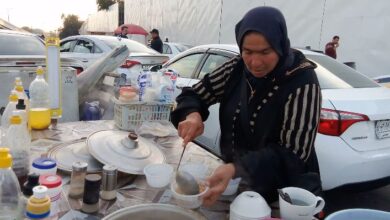DOUBLE THE PAIN: In underfunded, overcrowded Basra hospitals, birthing mothers are abused

The birth of her child was an excruciating experience for Jinan Mohammed, a 25-year-old Iraqi woman.
“The nurse paid no attention to my cries of pain. She smiled and told me I was exaggerating,” Mohammed recounts.
By Nagham Makki in Basra
Eventually the nurse took Mohammed into the delivery suit, which was so crowded there were no beds left and no curtains between the beds. “I asked where I should give birth and the nurse pointed at the floor,” Mohammed says.
In pain from labour, Mohammed could see no other option. She lay down on the stone floor and felt the baby coming out. “Later I developed a bacterial infection because of this,” the mother says. “I am still going to other doctors to try and recover from this infection.”
All of this happened to Mohammed at a government-run hospital in the southern Iraqi city of Basra and as it turns out, she is far from alone in her nightmarish experience. Al Menassa heard many stories of neglect, malpractice, corruption and even violence in Basra’s maternity wards.
Noor Jassem, 31, tells a similar story. When she went to the hospital with her mother, her own doctor was not on duty. She was taken to see another doctor, who told her she was not even in labour yet.
Jassem knew she was but returned to the waiting room. There her waters broke. “The nurse was so upset about the mess, looking at me in disgust,” Jassem says.
The nurse eventually delivered the baby herself and after cutting the umbilical cord went into the waiting room to see Jassem’s mother. She bent down and whispered in her ear, “where is my tip?”, Jassem recalls.
Jassem’s mother paid the nurse. A standard tip to a nurse is usually between US$3 and US$7.
Zainab Jaafar also went to a government-run health centre in Basra but says the nurse wouldn’t admit her until Jaafar’s husband paid her US$100.
Other women tell of verbal abuse, being told they are exaggerating the pain, and how they were forced to wait three or four hours in a waiting room, without being seen by anyone, while in labour. Often they may not bring anyone into the waiting room with them, they say.
No complaints
Some women have said they wanted to make official complaints afterwards. A hospital worker can be docked their pay or denied promotion as a result of complaints from patients. But this is difficult. Often the staff in question are not punished because personal connections or tribal contacts intervene. The case is often closed after this, with no real result for the complainant.
A source within the hospital says often the members of the different hospital departments collaborate to reduce the number of complaints, with the legal department and the nursing staff agreeing to ignore the complaint or bringing in tribal leaders from both parties, who then come up with their own, unofficial solution.
Often the mothers also fear their husband’s reaction if they make a fuss. Some are concerned about a possible scandal.
“We have received a few complaints like this,” says human rights activist, Amal Kabbashi says, “But they are almost impossible to confirm because the Ministry of Health refuses to release any data.”
Al Menassa tried to contact the local Department of Health for comment but the authorities did not return calls or emails.
A local gynaecologist, M. al-Hajiri warns of both physical and psychological consequences of such mistreatment.
“A patient may prefer to give birth using a private midwife next time, after such terrible treatment,” al-Hajiri suggests. “But this can be dangerous in the event of complications. It is possible they may need to be at the hospital.”
Basra-based researcher Zahra Ali Mohammed adds that it is usually the most at-risk women that are endangered by such practices. Low-income families cannot afford to go to private hospitals where they would receive better treatment or to tip the nurses to treat them better.
Mohammed says the situation is even worse for young girls, who may have been married before they were legally of age, or who have become pregnant earlier than expected. They find it even more difficult in the hospitals because they don’t know how to stand up for themselves.
Mohammed recounts the story of one 18-year-old who was in labour for two days. While in the hospital, a nurse would hit her on the legs every time she cried out in pain. The nurse also slapped the girl’s face and cursed her. The young girl delivered her child and left the hospital, covered in bruises. But she didn’t file a complaint.
Staff under pressure
The bad attitude of nursing and medical staff is perhaps a reflection of the state of Iraq’s health infrastructure, doctor al-Hajiri suggests. Government-run hospitals are often short staffed and underfunded. The Iraqi health system cannot keep up with the rapidly growing population.
In Basra, Iraq’s third largest city, there are 14 government-run hospitals for a population of 2.9 million, with beds for around 2,348 people, according to 2018 statistics.
“In many cases, the nurse or midwife finds herself alone, left to deliver a large number of pregnant women,” al-Hajiri notes. There’s also very little support for hospital staff working under pressure, with medical directors being told to organise workshops, further education and psychological support themselves.
Iraqi politician Faleh al-Zayadi, a member of Iraq’s last Parliament who was also on the health committee, says that the country spends around 5 percent of its overall budget on healthcare. That adds up to between US$150 and US$200 per Iraqi citizen. The rate of doctors per capita is also low, sitting at about 0.7 doctors for every thousand Iraqis in 2019, according to the World Bank. Other Middle Eastern countries, like Jordan and Iran have around 2 doctors per thousand people.
Adding to all this are the comparatively low salaries for nurses. The average monthly wage only goes as high as around US$1,350 and can be as low as US$870.




